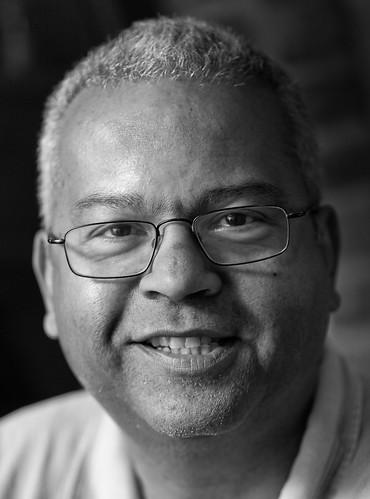Chris Bose is the head of Internet practice at In Press. For me his outstanding qualities are a razor-sharp mind, huge curiosity, a sense of fun and willingness to take himself and others out of their comfort zone. The following comes from a conversation we had in Bristol, UK on May 26th 2010, recorded with his consent for the purpose of this piece.
"Everyone plays to their own rules within the constraints of the system ... constraints are really important. In a prospect situation, people ask 'what would you do if you had infinite budget?' but that's a ridiculous question because there are always constraints and the best ideas come from constraints and discipline."
"I was challenged by one of my teachers when I was 17. He said 'you've just given a very precise answer' and I said 'actually I think I've given a very accurate answer, precision is something else' ... so I explained the difference and he said 'yes, you have a very precise mind.' "
SH - You have everything it takes to be a total pain in the arse, but you're not. How do you manage it?
"Because I make no attempt to be pendantic and I love to explore where the ideas go. So I hope that I give people the scope to explore their ideas. But I don't have this conversation with anyone else except you."
"Because I make no attempt to be pendantic and I love to explore where the ideas go. So I hope that I give people the scope to explore their ideas. But I don't have this conversation with anyone else except you."
SH - So you can be a pain in the arse with other people?
"I can come across like that, yes. But I've now chosen to use it as one of my filtering rules ... people who still think I'm a pain the arse, I will filter out from future contact."
"I would always be the one to put his hand up and ask awkward questions ... it takes practice, believe me ... I assume very little. I test everything. I set up experimental solutions ... I use conversation to test people out."
"My bigger purpose is that I was trained as a scientist, a research chemist. I want to continue being a scientist ... so I want to organise my business arond the principle of research ... on the Internet the numbers give me the ability to do that."
"You have to have an edge in life ... I believe it's important to hone my defensive skills all the time, even though they may never be called into action. But that's not the point .. I think it's right to have an edge all the time, but it's not an edge where the intent is to wound someone, verbally or whatever. That's quite a fine line sometimes - that's why it's called an edge (laughs)."





